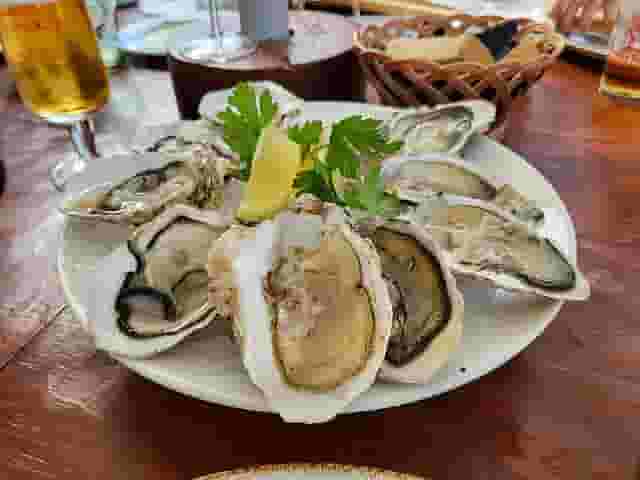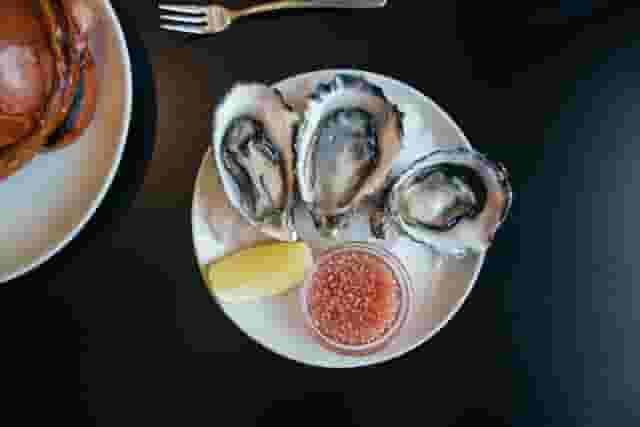The ketogenic diet, commonly known as the keto diet, emphasizes low carbohydrate, high-fat, and moderate protein intake to maintain a metabolic state called ketosis.
In ketosis, the body primarily burns fat for energy instead of carbohydrates, making it essential to select foods that align with this regimen carefully.
With seafood being a popular choice among keto followers, a common question arises: are oysters keto friendly? While oysters may seem like a nutritious addition to the diet, their carb content raises some concerns for strict keto practitioners.
In this article, we will explore the role of oysters within a keto lifestyle, examining their carb content, health benefits, and potential drawbacks.
How Ketogenesis Works
Ketogenesis is the metabolic process by which the body produces ketones to serve as an alternative energy source when glucose is scarce.
This typically occurs during periods of carbohydrate restriction, fasting, or prolonged exercise, which depletes glycogen stores in the liver. In response, the body switches from using glucose to burning fat for fuel.
During ketogenesis, the liver breaks down fatty acids into acetyl-CoA. When glucose levels remain low, acetyl-CoA molecules are converted into three types of ketones:
- Acetoacetate
- Beta-hydroxybutyrate (BHB)
- Acetone
These ketones are released into the bloodstream and transported to tissues, including the brain and muscles, where they are used for energy.
The goal of the ketogenic diet is to maintain the body in this fat-burning state (ketosis), making ketogenesis an essential mechanism for those following the keto lifestyle.
Are Canned Oysters Keto Friendly?
Canned oysters can be keto-friendly, but it depends on the ingredients and preparation method.
While plain canned oysters typically contain around 3 to 4 grams of net carbs per 100 grams, some varieties include added ingredients like sauces, oils, or sugars that increase the carb content.
To ensure they fit within a keto diet, it is essential to check the labels for hidden carbs and avoid those with added sugars or starches.
When consumed in moderation and paired with other low-carb foods, plain canned oysters can be a convenient and keto-friendly option.
Nutritional Profile of Oysters
To answer the question, are oysters keto friendly? We must determine whether oysters fit within the keto framework, which requires an understanding of their nutritional profile, carb content, and how they affect ketosis.
Oysters are nutrient-dense, providing essential minerals like zinc, selenium, iron,omega-3 fatty acids and vitamin B12.
They also contain a balanced combination of carbohydrates, proteins, and fats.
A typical serving of six medium-sized oysters (about 100 grams) provides approximately 7 grams of protein, 2 grams of fat, and 3 to 4 grams of carbohydrates.
Oysters contain slightly more carbs than other shellfish, which may be a consideration for individuals on a strict keto plan.
Carbohydrate Content of Oysters
Oysters contain a modest amount of carbohydrates, with approximately 3 to 4 grams per 100-gram serving.
While this carb content may not seem excessive, it can add up quickly if consumed in large portions, potentially affecting ketosis.
Canned oysters, in particular, may contain added sugars or starches, making it essential to check the labels carefully.
As long as they do not have hidden carbs, canned oysters can still fit within a keto diet.
Can You Have Oysters on a Strict Keto Diet?
Yes, oysters can be part of a strict keto diet, but portion control is essential to avoid exceeding daily carb limits.
A strict keto regimen typically limits carb intake to 20 to 25 grams per day, so eating more than one serving of oysters could reduce the flexibility to consume other keto-friendly foods.
To answer the question—are oysters keto friendly? Yes, they are, but only when consumed mindfully within the allowable carb range.
Health Implications of Oysters on a Keto Diet
Incorporating oysters into a keto diet offers several health benefits. Oysters are an excellent source of antioxidants, omega-3 fatty acids, and essential minerals like zinc and iron, which support immune function, cardiovascular health, and cognitive performance.
They also provide lean protein that aids muscle repair and recovery, complementing the ketogenic diet’s protein needs.
However, consuming too many oysters may increase carb intake beyond the keto limit, potentially disrupting ketosis.
There is also a small risk of heavy metal exposure and shellfish allergies, which individuals should consider when eating oysters regularly.
Incorporating Oysters into Your Keto Meal Plan
Incorporating oysters into your keto meal plan requires balancing portion sizes with other low-carb foods.
A few serving ideas include enjoying raw oysters with a squeeze of lemon or hot sauce, grilling oysters with butter and garlic, or preparing an oyster chowder using heavy cream and low-carb vegetables.
Pairing oysters with avocados, leafy greens, or keto-friendly sauces adds variety to the meal while maintaining ketosis. To ensure that oysters remain keto compliant, limit the portions to maintain your daily net carb target.
Keto-Compatible Alternatives for Oysters
For those seeking alternatives, there are several keto-compatible seafood options with lower carb content than oysters. Scallops, shrimp, crab, and fatty fish like salmon and mackerel offer excellent alternatives that are rich in protein and omega-3 fatty acids without the carb content found in oysters.
Shrimp
Shrimp is a highly suitable alternative to oysters for those following a keto diet. It contains zero grams of net carbs per 100-gram serving, making it ideal for strict keto regimens.
Shrimp also provides essential nutrients such as selenium, iodine, and vitamin B12. These nutrients support metabolic and immune health.
Shrimp can be grilled, tossed, or served with avocado and leafy greens.

Clams
Clams are a great keto-compatible alternative to oysters due to their low carb content and high nutrient density.
A 100-gram serving of clams contains around 2 grams of net carbs, making them suitable for those on a keto diet.
They are rich in iron, vitamin B12, and omega-3 fatty acids, supporting cardiovascular and metabolic health.
Clams can be steamed and tossed.
Scallops
Scallops are an excellent keto-compatible alternative to oysters because they are low in carbs and high in protein.
A 100-gram serving of scallops contains about 1.2 grams of net carbs, making them suitable for keto diets.
They are also packed with vitamin B12, magnesium, and healthy omega-3 fatty acids, which promote heart and brain health.
Crab
Crab is a highly keto-compatible alternative to oysters due to its zero net carbs and high protein content.
It is rich in essential nutrients such as zinc, selenium, and omega-3 fatty acids, which support immune function and heart health.
Salmon
Salmon is an excellent keto-compatible alternative to oysters due to its zero carbs and high content of healthy fats.
It is rich in omega-3 fatty acids, which support heart health and reduce inflammation.
Salmon is versatile and fits perfectly into many keto meals, whether grilled, baked, or pan-seared with butter.
It pairs well with low-carb vegetables like asparagus or avocado, making it a satisfying and nutritious option for those following a ketogenic diet.
Mussels
Mussels are a great keto-compatible alternative to oysters, with around 3 grams of net carbs per 100 grams.
They are nutrient-dense, providing high-quality protein, omega-3 fatty acids, iron, and vitamin B12.
Mussels are easy to incorporate into keto meals by steaming them with butter and garlic or adding them to low-carb seafood soups.
While their carb content is slightly higher than some other shellfish, mussels can still fit within a keto diet when consumed in moderation.
FAQs: Are Oysters Keto Friendly?
1. Are Oysters High in Carbs?
No, oysters are not high in carbs, containing 3-4 grams of net carbs per 100 grams, making them suitable for low-carb diets in moderation.
2. Can I Eat Oysters Every Day on Keto?
Yes, you can eat oysters daily on keto, but portion control is essential to stay within your daily carb limit.
3. Do Canned Oysters Contain Hidden Carbs?
Some canned oysters may contain hidden carbs from added sugars or sauces, so it’s important to check the labels carefully.
4. What Is the Best Way to Enjoy Oysters on Keto?
The best way to enjoy oysters on keto is raw with lemon juice or grilled with butter and garlic to keep the carb content low.
5. How Do Oysters Compare to Other Seafoods?
Oysters have slightly more carbs than shrimp, crab, or salmon, with 3-4 grams of net carbs per 100 grams, but they are still keto-friendly in moderation.
Conclusion: Are Oysters Keto Friendly?
The simple answer to the question: are oysters keto friendly? Is yes. They can fit within a keto diet, but portion control and mindfulness are essential.
Whether raw or canned, oysters provide essential nutrients and can be a valuable addition to a well-planned keto lifestyle.
However, individuals on a strict keto diet should carefully monitor carb intake to stay within ketosis.
When incorporating oysters into your meals, balance them with other keto-friendly foods. Foods like avocados, leafy greens, or fatty fish to enhance both flavor and nutritional value.


Leave a Reply